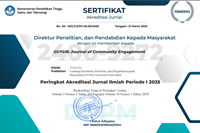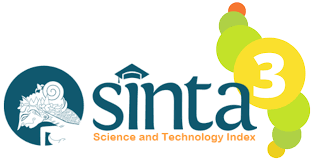Afriansyah, Afdhal, Mustanir, A., Faried, A. I., Mursalat, A., Kusnadi, I. H., Fauzan, R., Amruddin, D., Siswanto, D., Widiyawati, R., & Abdurohim. (2023). Pemberdayaan masyarakat. PT Global Eksekutif Teknologi. ISBN: 978-623-198-033-5.
AG, M., Larasati, E., Warsono, H., & Kismartini, K. (2024). Village Community Economic Empowerment in Pidie Regency: Challenges and Opportunities in Utilizing Information Technology and Enhancing Participation. Jurnal Public Policy, 10(2), 76. https://doi.org/10.35308/jpp.v10i2.8873
Dushkova, D., & Ivlieva, O. (2024). Empowering communities to act for a change: A review of the community empowerment programs towards sustainability and resilience. Sustainability, 16(19), 8700. https://doi.org/10.3390/su16198700
Firnanda, N. P., Solfema, & Dasa Putri, L. (2025). Ekonomi kreatif sebagai upaya pemberdayaan masyarakat di bidang ekonomi. Jurnal Pendidikan dan Ilmu Sosial, 3(1), 161–167. https://doi.org/10.54066/jupendis.v3i1.2814
Gaffar, N. R., & Rusdianto, R. Y. (2024). Peran fasilitator pendamping dalam pemberdayaan UMKM untuk meningkatkan kemampuan branding usaha nasabah BTPN Syariah Area Site Plampang, Kabupaten Sumbawa. Economics and Business Management Journal (EBMJ), 3(2), 111–115.
Harini, N., Suhariyanto, D., Indriyani, I., Novaria, N., Santoso, A., & Yuniarti, E. (2023). Pendampingan pemberdayaan masyarakat dalam meningkatkan perekonomian desa. Amalee: Indonesian Journal of Community Research and Engagement, 4(2), 363–375. https://doi.org/10.37680/amalee.v4i2.2834
Hoerniasih, N. (2019). Lifelong learning dalam pemberdayaan masyarakat untuk kemandirian berwirausaha. Indonesian Journal of Adult and Community Education, 1(1), 31–39. https://doi.org/10.17509/ijace.v1i1.20008
Ibrahim, A., Rifa’i, B., & Dewi, R. (2020). Pemberdayaan masyarakat melalui PKBM untuk meningkatkan keterampilan masyarakat miskin. Tamkin: Jurnal Pengembangan Masyarakat Islam, 5(4), 475–496. https://jurnal.fdk.uinsgd.ac.id/index.php/tamkin
Kusaimah, K., Dahri, M., & Putri, Z. (2024). Enhancing student entrepreneurship through empowerment of local wisdom in the community of Bangko. Vox Populi: Jurnal Umum Pengabdian Kepada Masyarakat, 1(1), 1–11. https://doi.org/10.70308/voxpopuli.v2i1.86
Martz, J. R., Romero, V., & Anderson, J. R. (2020). Facilitators and barriers of empowerment in family and domestic violence housing models: A systematic literature review. Australian Psychologist, 55(5), 440–454. https://doi.org/10.1111/ap.12454
Putri, A. F., & Nurhadi, N. (2024). Peran fasilitator pendamping dalam pemberdayaan ibu-ibu prasejahtera produktif untuk meningkatkan pendapatan UMKM nasabah PT Bank BTPN Syariah Tbk. SAMMAJIVA: Jurnal Penelitian Bisnis dan Manajemen, 2(1), 95–105. https://doi.org/10.47861/sammajiva.v2i1.782
Santika, T., Fadili, D. A., Dewi, R. S., & Ansori, A. (2023). Pendampingan pemberdayaan masyarakat melalui Usaha Mikro Kecil Menengah (UMKM) di Desa Kalijati Kecamatan Jatisari Kabupaten Karawang. Abdimas Siliwangi, 6(2), 435–443. https://doi.org/10.22460/as.v6i2.16945
Sari, L. I., & Fitriana, N. H. I. (2024). Peran fasilitator pendampingan dalam pengembangan Usaha Mikro Kecil Menengah (UMKM) nasabah BTPN Syariah di Kecamatan Wongsorejo Banyuwangi Jawa Timur. JIPM: Jurnal Informasi Pengabdian Masyarakat, 2(1), 76–82. https://doi.org/10.47861/jipm-nalanda.v2i1.764
Setyorini, A., & Masulah, M. (2020). Penerapan Project Based Learning untuk Meningkatkan Kemampuan Guru-Guru Sekolah Dasar Sidoarjo dalam Menulis Kreatif Cerita Anak. Aksiologiya: Jurnal Pengabdian Kepada Masyarakat, 4(1), 131. https://doi.org/10.30651/aks.v4i1.3664
St-Jean, É., & Tremblay, M. (2020). Mentoring for entrepreneurs: A boost or a crutch? Long-term effect of mentoring on self-efficacy. International Small Business Journal: Researching Entrepreneurship, 38(5), 424–448. https://doi.org/10.1177/0266242619901058
Sulandjari, K. (2023). The effect of entrepreneurial skills and business mentoring on startup growth and success in West Java. The Es Economics and Entrepreneurship, 2(02), 147–156. https://doi.org/10.58812/esee.v2i02
Suminar, T., Arbarini, M., Shofwan, I., & Setyawan, N. (2020). Pendampingan yang efektif bagi tutor dengan model pembelajaran Introduction, Connection, Application, Reflection, Extension (ICARE). Semarang: Jurusan Kurikulum dan Teknologi Pendidikan, Fakultas Ilmu Pendidikan, Universitas Negeri Semarang.
Suyanto, S., Standsyah, R. E., & Ramadhan, D. S. (2024). Community economic empowerment for the creation of self-sufficient villages. Help: Journal of Community Service, 1(2), 149–156. https://doi.org/10.62569/hjcs.v1i2.63
Tulusan, F. M. G., Kolondam, H. F., Kunci, K., Kerja, K., & Masyarakat, P. (n.d.). Kemampuan kerja fasilitator dalam pendampingan masyarakat di Desa Ranoketang tua kecamatan amurang kabupaten minahasa selatan Marsela Rumampuk
Vujko, A., Karabašević, D., Cvijanović, D., Vukotić, S., Mirčetić, V., & Brzaković, P. (2024). Women’s empowerment in rural tourism as key to sustainable communities’ transformation. Sustainability, 16(23), 10412. https://doi.org/10.3390/su162310412
Wicaksono, S. R. B., & Iryanti, E. (2024). Peran fasilitator pendamping BTPN Syariah dalam mengembangkan identitas merek dan dampaknya terhadap penjualan produk di MMS Bakung. Jurnal Paradigma Ekonomika, 19(4), 1007–1016.
 (Universitas Negeri Semarang)
(Universitas Negeri Semarang) 









.png)
